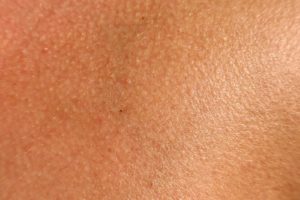
Well, the results of new research about skin with psoriasis compared to healthy skin isn't surprising. The research found that skin with psoriasis has a distinct microbiome (community of bacteria, viruses, fungi) - one that is different from that of healthy persons.
A main finding was that the types of bacteria were lower (less diversity) on the psoriatic skin. Greater diversity of bacteria is considered good - a sign of health. Levels of Staphylococcus were higher in the psoriatic skin, but healthy skin had higher levels of Cutibacterium and Kocuria.
Oher research also supports the view that microbes are somehow involved with the development of psoriasis. The hope is that someday treatment could be just taking a probiotic pill or applying certain microbes to the skin, perhaps in a lotion. Wouldn't that be great?
Excerpts from Medscape: Psoriasis and Psoriatic Arthritis Show Distinctive Skin Microbiomes
The bacterial diversity in lesional and nonlesional skin of patients with psoriasis (PsO) with or without psoriatic arthritis (PsA) was significantly lower than that of healthy control skin, based on data from 74 individuals.
Previous studies in humans and animals have suggested that microbes play a role in PsO pathogenesis, but microbial analyses of PsA are lacking, wrote Alba Boix-Amorós, PhD, of the Icahn School of Medicine at Mount Sinai, New York City, and colleagues.
In a study published in Annals of the Rheumatic Diseases, the researchers recruited 23 patients with PsO and 31 with PsA from the dermatology and rheumatology clinics at the NYU Grossman School of Medicine/NYU Langone Health in New York City. An additional 20 healthy individuals with no history of PsA or PsO were recruited from within NYU to serve as controls. All participants were aged 18 years and older, and more than 75% were white. Males made up 65.4%, 47.8%, and 55.0% of the PsA, PsO, and control groups, respectively.
The researchers collected skin swabs from lesional and nonlesional skin of individuals with PsO and PsA and from the upper and lower extremities of the healthy controls. The microbiota analysis included 148 samples that were analyzed using 16S rRNA sequencing.
No significant microbiome differences were noted between lesional and nonlesional PsO and PsA samples. The finding that the microbiome of nonlesional psoriatic skin was more similar to lesional psoriatic skin than to healthy skin was unexpected, and suggests the development of microbial dysbiosis in psoriatic skin independent of the presence of lesions, the researchers wrote.
The researchers also found that levels of Corynebacterium in nonlesional PsA samples were significantly elevated, compared with nonlesional PsO samples (P < .05), which suggests a possible role for the microbe as a biomarker for disease progression, the researchers said.
